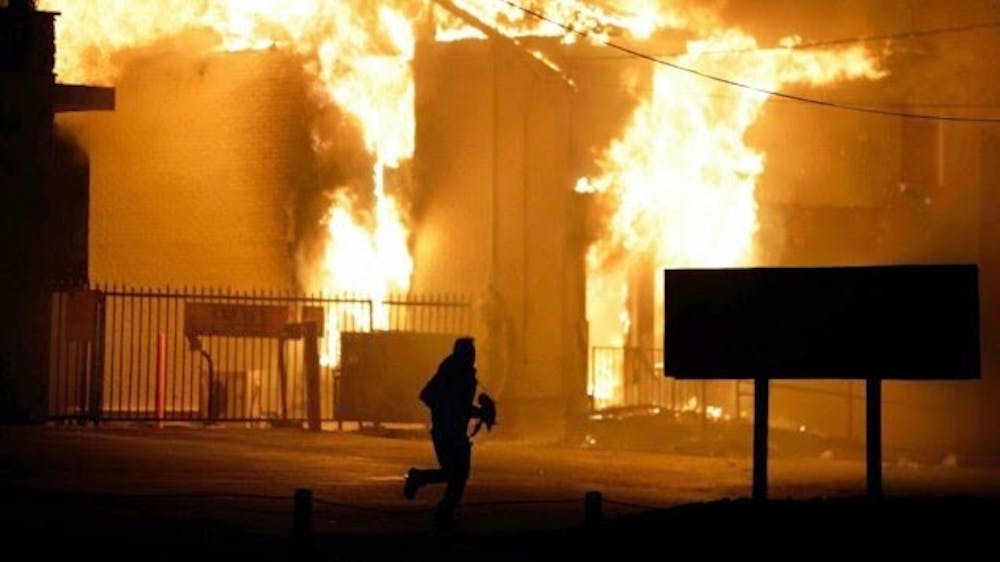COLUMN: Justice for Brown was lost during Ferguson Riot

Firefighters work on extinguishing the burning Little Ceasar's restaurant in Ferguson on Nov. 24, after a grand jury chose not to indict Darren Wilson, the white police officer who shot and killed Michael Brown. (Tannen Maury / EPA)
Last night, Ferguson, Mo. burned for no reason – and most certainly not in remembrance of slain teenager Michael Brown.
On Monday night, it was announced that a grand jury would not seek an indictment against Darren Wilson, the Ferguson police officer who shot and killed Brown on Aug. 9.
As Robert McCulloch, St. Louis County's prosecutor, read the decision it became clear that Brown’s family – and the protestors that rallied around them for months – lost a meaningful battle in a much larger war against police brutality.
We all knew that violence would follow.
African Americans were introduced to America through the most violent of circumstances. As they fought for freedom and basic human rights, they were bitten by dogs and stung by fire hoses. Today, despite major advances, they are continuously subjected to profiling, harassment and police-sanctioned brutality.
A protest calling foul on the Ferguson decision was justified, much as they were when Brown was murdered. For a few others, the riots that engulfed the city Monday night also were justified.
But know this: Any sense of justice for the slain Brown was absolutely obliterated by a few hundred ruffians looking to take advantage of the volatile situation.
History has a nasty way of repeating itself. In the 1960s, race riots showed us just how fed up African Americans were with their institutionalized lack of civil rights. Later in the 1990s, not 30 years later, riots sparked by police brutality showed us how far we still needed to go until all races were valued as equals in this country.
Now, we ostensibly see how far we’ve regressed in that pursuit. Monday’s ruling was an example of a massive step backward.
Seeing angry men flip a cop car on TV next to a poorly juxtaposed shot of an emotionless President Barack Obama calling for calm in the streets was surreal – but understandable. Seeing that same vehicle ignited after canisters of tear gas were lobbed at protestors was frightening, but again, entirely understandable.
When those fires spread to local, black-owned family businesses – undoubtedly the pillars of the Ferguson community – this defensible fury was erased and became pure thuggery.
Looting a liquor store is not an expression of political outrage; breaking glass in a McDonald’s storefront carries no social commentary. This behavior a sad caricature of the stereotypes these out-of-control cops use to prejudicially profile black men on a daily basis.
Even worse, the Ferguson Liquor Store, the site of Brown’s murder and his unofficial memorial, was the first business to be raided by men and women fueled by anarchy and greed. The glass they smashed was draped in the posters used to champion the Brown family’s cause – the ones with the starkly illustrated black hands imploring an invisible police officer to not shoot the body to which they were ethereally attached.
Police are reporting that they didn’t fire a single shot. Rioters fired 150. Wilson was wrong and should be held accountable. Brown didn’t deserve to lose his life. But now a great many others in the Ferguson community are without their livelihood, and that cannot and should not be forgiven.
In retrospect, the movement sparked by Brown’s death died last night at the hands of people who never gave one thought to preserving his memory or making life better for minorities in poor communities.
“Change is brought about by our voices, not the destruction of our community,” said Ferguson Police Captain Ron Johnson.
If Day One of the Ferguson Riots is any indication, change in American race relations is a long, long, long way away.






